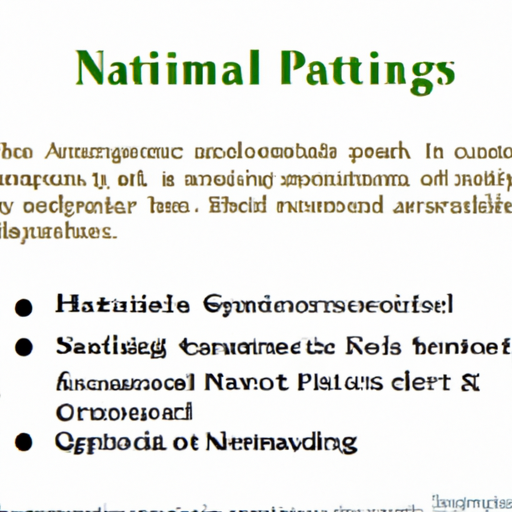In your quest to keep your furry friends happy and healthy, you may have wondered if there are natural alternatives to commercial wormers for parasite prevention. Well, wonder no more! This article aims to explore the various options available that can serve as effective alternatives to traditional wormers. From herbal remedies to dietary changes, there are plenty of natural strategies you can try to keep your pets parasite-free. So, let’s delve into the world of natural parasite prevention and discover how you can provide the best care for your beloved companions.
Herbal Remedies
Garlic
Garlic is a versatile herb that has been used for centuries for its medicinal properties. It is known for its antimicrobial and antiparasitic effects, making it an effective natural remedy for parasite prevention. Garlic contains compounds such as allicin, which has been shown to inhibit the growth of parasites and boost the immune system. Incorporating garlic into your pet’s diet can help keep parasites at bay and promote overall health.
Pumpkin Seeds
Pumpkin seeds are not only a tasty snack, but they also provide numerous health benefits for your pet. These seeds contain a compound called cucurbitacin, which has been found to have anthelmintic properties, meaning it can help expel parasites from the digestive tract. Ingesting pumpkin seeds regularly can aid in preventing and treating intestinal parasites in your furry friends.
Black Walnut
Black walnut is another herbal remedy that has been used for centuries to treat various health conditions, including parasite infestations. The hulls of black walnuts contain a compound called juglone, which has antiparasitic properties. Incorporating black walnut powder or tincture into your pet’s diet can help prevent and manage parasitic infections.
Diatomaceous Earth
Diatomaceous earth is a natural substance made from the fossilized remains of diatoms, a type of algae. This powdery substance is rich in silica, which is known for its ability to kill parasites by dehydrating them. Diatomaceous earth can be used as a dietary supplement or applied topically to help control and prevent parasites in animals.
Homeopathy
Cina
Cina is a homeopathic remedy that has been used for centuries to treat parasitic infections. It is derived from the herb Artemisia cina, commonly known as wormseed. Cina is particularly effective in treating worm infestations, such as pinworms and roundworms. This homeopathic remedy works by stimulating the body’s natural defenses and helping to expel parasites.
Ferrum Phosphoricum
Ferrum phosphoricum, also known as iron phosphate, is a homeopathic remedy that is often used to support the immune system and help prevent parasitic infections. It is recommended for animals who are prone to recurrent infections or have a weakened immune system. Ferrum phosphoricum can help bolster the body’s defenses and reduce the risk of parasitic infestations.
Cina-Mercurius Solubilis
Cina-mercurius solubilis is a combination homeopathic remedy that is often used to address both the physical and emotional symptoms associated with parasite infestations. It can help alleviate symptoms such as restlessness, irritability, and digestive issues. Cina-mercurius solubilis can be an effective natural remedy for managing parasitic infections in animals.
Teucrium Marum
Teucrium marum, also known as cat thyme, is a homeopathic remedy that has been used for centuries to address parasitic infestations, particularly in cats. It is known for its antiparasitic and insecticidal properties. Teucrium marum can be used as a natural alternative to commercial wormers to help prevent and manage parasitic infections in feline companions.
Essential Oils
Tea Tree Oil
Tea tree oil, derived from the leaves of the tea tree plant, is a popular essential oil known for its antimicrobial properties. It has been found to be effective against a wide range of parasites, including fleas, ticks, and mites. However, it is important to note that tea tree oil should never be used undiluted on pets, as it can be toxic when ingested or applied directly to the skin. Always dilute tea tree oil properly and consult with a veterinarian before using it on your pet.
Clove Oil
Clove oil is another essential oil that has potent antimicrobial properties, making it an effective natural remedy for parasite prevention. It is particularly effective against parasites such as fleas and ticks. However, similar to tea tree oil, clove oil should be diluted before use and used with caution. It is important to consult with a veterinarian before using essential oils on your pet.
Lavender Oil
Lavender oil is well-known for its calming and soothing effects, but it also has antimicrobial properties that can help prevent and manage parasitic infestations. Lavender oil can be used in a diffuser to repel fleas and ticks, or it can be diluted and applied topically to help soothe itching and inflammation caused by parasites. Always use lavender oil properly diluted and consult with a veterinarian before using it on your pet.
Thyme Oil
Thyme oil is a powerful essential oil that has antimicrobial, antiparasitic, and insecticidal properties. It has been found to be effective against a variety of parasites, including fleas, ticks, and mites. Thyme oil can be used as a natural alternative to commercial flea and tick repellents or as a treatment for parasitic infestations. However, it is important to dilute thyme oil properly and consult with a veterinarian before using it on your pet.
Probiotics
Introduction to Probiotics
Probiotics are beneficial bacteria that provide a wide range of health benefits, including improving digestion, boosting the immune system, and preventing parasitic infections. By colonizing the gut with beneficial bacteria, probiotics create an environment that is less hospitable to parasites. Additionally, probiotics can help strengthen the intestinal barrier, making it more difficult for parasites to invade the body.
Effectiveness in Parasite Prevention
Multiple studies have shown the effectiveness of probiotics in preventing and managing parasitic infections in animals. Probiotics can help reduce the overall parasite burden in the gut and support the body’s natural defenses against parasites. They have been found to be particularly effective against gastrointestinal parasites such as roundworms, hookworms, and Giardia.
Types of Probiotics for Parasite Prevention
There are different strains of probiotics that have been found to be effective in preventing and managing parasitic infections. Lactobacillus acidophilus, Bifidobacterium bifidum, and Saccharomyces boulardii are examples of probiotic strains that have shown efficacy against parasites. It is important to choose a probiotic supplement that contains these specific strains for optimal parasite prevention.
Dosage and Administration
The dosage and administration of probiotics for parasite prevention can vary depending on the size and weight of the animal. It is recommended to consult with a veterinarian to determine the appropriate dosage for your pet. Probiotics can be administered orally, either in the form of a powder, capsule, or liquid. It is important to follow the instructions provided by the manufacturer and monitor your pet for any adverse reactions.
Traditional Remedies
Papaya Seeds
Papaya seeds have been used in traditional medicine to expel parasites from the body. They contain an enzyme called papain, which has been found to have anthelmintic properties. Papaya seeds can be ground into a powder and mixed with food to help prevent and manage parasitic infections in animals. However, it is important to consult with a veterinarian before incorporating papaya seeds into your pet’s diet, as they can be toxic in large quantities.
Cloves
Cloves have long been used in traditional medicine for their antimicrobial and antiparasitic properties. They contain a compound called eugenol, which has been found to be effective against parasites such as fleas, ticks, and intestinal worms. Cloves can be used as a natural repellent or added to pet food to help prevent and manage parasitic infestations. It is important to use cloves in moderation and consult with a veterinarian before using them on your pet.
Pomegranate Peel
Pomegranate peel has been used in traditional medicine as a natural remedy for various health conditions, including parasitic infections. It contains compounds such as ellagitannins and punicalagins, which have been found to have anthelmintic properties. Pomegranate peel can be ground into a powder and added to pet food to help expel parasites from the digestive tract. However, it is important to consult with a veterinarian before using pomegranate peel on your pet.
Wormwood
Wormwood, also known as Artemisia absinthium, is a traditional herbal remedy for parasite prevention. It contains a compound called absinthin, which has been found to have antiparasitic properties. Wormwood can be used as a natural repellent or incorporated into herbal formulations to help prevent and manage parasitic infestations. However, it is important to use wormwood with caution, as it can be toxic in high doses. Consult with a veterinarian before using wormwood on your pet.
Natural Dietary Supplements
Vitamin C
Vitamin C is an essential nutrient that plays a crucial role in the immune system and overall health. It has been found to enhance the body’s natural defenses against parasites and reduce the risk of parasitic infections. Vitamin C can be added to your pet’s diet through supplementation or by feeding them fruits and vegetables that are rich in this vitamin, such as oranges, strawberries, and bell peppers.
Coconut Oil
Coconut oil is a versatile natural remedy that has numerous health benefits for pets, including parasite prevention. It contains lauric acid, which has been found to have antiparasitic properties. Coconut oil can be added to your pet’s food or applied topically to help repel fleas and ticks. It is important to use organic, unrefined coconut oil and consult with a veterinarian before using it on your pet.
Apple Cider Vinegar
Apple cider vinegar has been used for centuries as a natural remedy for various health conditions. It has antimicrobial properties that can help prevent and manage parasitic infections. Apple cider vinegar can be added to your pet’s food or water to help create an environment that is less attractive to parasites. It is important to use raw, unpasteurized apple cider vinegar and dilute it properly before using it on your pet.
Bitter Herbs
Bitter herbs such as dandelion, gentian root, and chamomile can help promote digestive health and prevent parasitic infections. These herbs stimulate the production of digestive enzymes and bile, which can help eliminate parasites from the body. Bitter herbs can be included in your pet’s diet through supplementation or by incorporating them into homemade meals. It is important to consult with a veterinarian before using bitter herbs on your pet.
Environmental Control
Cleanliness and Hygiene
Maintaining cleanliness and good hygiene practices is crucial in preventing parasite infestations in animals. Regularly cleaning and disinfecting your pet’s living area, bedding, and food/water bowls can help eliminate parasites and their eggs. It is also important to practice proper personal hygiene, such as washing your hands after handling animals or cleaning up after them, to prevent the spread of parasites.
Regular Deworming Schedule
Implementing a regular deworming schedule is an important part of parasite prevention. Consult with a veterinarian to determine the appropriate deworming protocol for your pet based on their age, lifestyle, and risk factors. Deworming medications can help eliminate existing parasites and prevent new infestations. It is important to follow the recommended dosage and administration guidelines provided by the veterinarian.
Avoiding Contaminated Areas
Avoiding areas that are known to be contaminated with parasites can help reduce the risk of infestation. This includes avoiding contact with feces from infected animals and keeping your pet away from areas where parasites are commonly found, such as tall grass, wooded areas, and stagnant water. By minimizing exposure to contaminated environments, you can significantly lower the risk of parasite infestations.
Managing Waste and Fecal Matter
Proper management of waste and fecal matter is essential in preventing the spread of parasites. Regularly clean up after your pet and dispose of waste properly. It is also important to follow appropriate fecal management practices, such as regular fecal testing and safe disposal of feces. By implementing effective waste management strategies, you can help reduce the risk of parasite transmission.
Preventive Practices
Natural Pest Control
Implementing natural pest control measures can help prevent parasites from infesting your pet. This includes using natural repellents, such as essential oils or herbal formulations, to deter fleas, ticks, and other pests. Regularly grooming your pet and checking for signs of infestation can also help identify and manage parasites before they become a problem.
Reducing Exposure to Parasites
Reducing your pet’s exposure to parasites is an important preventive measure. Avoid allowing your pet to interact with stray or unknown animals, as they may carry parasites. Keep your pet on a leash or within a secure area to prevent them from wandering into contaminated environments. Regularly check and remove any ticks or fleas that may be present on your pet’s fur.
Maintaining a Balanced Diet
A well-balanced and nutritious diet plays a crucial role in maintaining your pet’s overall health and immune system. Feeding a high-quality diet that is appropriate for your pet’s age, species, and breed can help strengthen their natural defenses against parasites. Consult with a veterinarian to determine the best diet for your pet’s specific needs.
Regular Veterinary Check-ups
Regular veterinary check-ups are essential in monitoring your pet’s health and detecting any signs of parasitic infestation. Your veterinarian can perform fecal tests, blood tests, and physical examinations to identify any parasites or potential risk factors. They can also provide guidance on preventive measures and recommend appropriate treatments if necessary.
Biosecurity Measures
Quarantine of New Animals
Quarantining new animals before introducing them to your existing pets is an important biosecurity measure. This can help prevent the introduction of parasites or other contagious diseases to your resident animals. Quarantine periods can vary depending on the species and the specific health status of the new animal. Consult with a veterinarian to determine the appropriate quarantine procedures.
Separate Housing for Infected Animals
If one of your animals becomes infected with parasites, it is important to separate them from healthy animals to prevent further transmission. Providing separate housing or designated areas for infected animals can help minimize the spread of parasites and allow for proper treatment and management. Consult with a veterinarian for guidance on the appropriate quarantine and housing protocols.
Disinfection Protocols
Implementing effective disinfection protocols is crucial in preventing the spread of parasites. Clean and disinfect all equipment, surfaces, and housing areas regularly, especially after exposure to parasites or infected animals. Use appropriate disinfectants that are effective against parasites, and follow the manufacturer’s instructions for proper application and dilution.
Monitoring and Surveillance
Regular monitoring and surveillance of your animals can help detect any signs of parasitic infestation or disease. Keep a close eye on your pet’s behavior, appetite, and overall appearance. Look out for symptoms such as weight loss, diarrhea, vomiting, or excessive scratching. If you notice any abnormalities or suspect a parasitic infestation, consult with a veterinarian for further evaluation and treatment.
Research and Efficacy
Scientific Studies on Natural Alternatives
Numerous scientific studies have been conducted to evaluate the efficacy of natural alternatives for parasite prevention in animals. These studies have demonstrated the effectiveness of various herbs, essential oils, probiotics, and dietary supplements in reducing the risk of parasitic infestations. However, it is important to note that the efficacy can vary depending on the specific parasite, animal species, and individual factors. Further research is needed to fully understand the potential benefits and limitations of natural alternatives.
Comparative Analysis of Natural and Commercial Wormers
Comparative analysis studies have compared the effectiveness of natural alternatives and commercial wormers in preventing and managing parasitic infections. These studies have found that natural alternatives can be as effective as commercial products in certain cases, particularly against gastrointestinal parasites. However, it is important to consider factors such as the type of parasite, its lifecycle, and the individual animal’s health and immune status when making a decision on parasite prevention methods.
Expert Opinions and Recommendations
Many experts in veterinary medicine and alternative therapies have provided opinions and recommendations on natural alternatives for parasite prevention. These experts emphasize the importance of a holistic approach to parasite control, which includes proper nutrition, hygiene practices, and the use of natural remedies. However, they also acknowledge that individual animals and parasite cases may require different treatment approaches, and recommend consulting with a veterinarian for personalized advice.
Considering Individual Animal Factors
When considering natural alternatives for parasite prevention, it is important to take into account individual animal factors. Each animal is unique and may have different health conditions, dietary needs, and susceptibility to parasites. Factors such as age, breed, size, lifestyle, and pre-existing health conditions can influence the effectiveness of natural remedies. Consult with a veterinarian to determine the most suitable and safe options for parasite prevention based on your pet’s specific needs.
In conclusion, natural alternatives to commercial wormers for parasite prevention exist and can be effective in reducing the risk of parasitic infestations in animals. Herbal remedies, homeopathy, essential oils, probiotics, traditional remedies, natural dietary supplements, environmental control measures, preventive practices, biosecurity measures, and proper research are all essential aspects to consider when exploring natural alternatives for parasite prevention. Consult with a veterinarian to determine the most suitable combination of natural remedies and preventive measures for your pet’s specific needs. By incorporating these natural alternatives into your pet’s routine, you can help protect them from parasites and promote their overall health and well-being.




